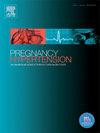加纳孕妇家庭参与家庭血压监测的观点:定性分析
IF 2.9
4区 医学
Q2 OBSTETRICS & GYNECOLOGY
Pregnancy Hypertension-An International Journal of Womens Cardiovascular Health
Pub Date : 2025-07-30
DOI:10.1016/j.preghy.2025.101245
引用次数: 0
摘要
目的(1)探讨加纳孕妇对家庭参与血压监测(HBPM)的看法;(2)明确孕妇HBPM的家庭参与形式;(3)了解家庭参与对孕妇HBPM的影响。研究设计。这项现象学定性研究是在加纳城市的一家三级医院进行的。参与者为参与HBPM的成年孕妇。参与者接受了视听和实践HBPM培训,并完成了2-4周的每日血压监测。主要结果测量。半结构化访谈评估了参与者对家庭参与HBPM的看法。采访被录音、翻译、转录、编码,并进行主题分析。结果33名参与者完成了深度访谈。参与者的平均年龄为31.2±5.2岁,30.3%的人以前没有生育过,39.4%的人受教育程度低于高中。总体而言,参与者认为他们的家庭参与使HBPM更容易,更积极的体验。家庭参与有三种形式:1)认可,2)帮助,3)参与。所有家庭成员都同意HBPM。帮助和参与与最积极的看法有关。参与者将家庭团聚、HBPM的享受和压力的减少作为结果。家庭参与的消极方面是来自儿童的干扰和参与者倾向于单独监督,很少经历,并且能够克服。结论:在加纳城市的孕妇中,家庭参与HBPM被认为是有益的和愉快的,产生了心理社会效益,并可能有助于克服中低收入国家HBPM的障碍。缩写词:BP,血压;HBPM,家庭血压监测;妊娠期高血压疾病;中低收入国家;科勒布教学医院KBTH;妇产科;产前保健。本文章由计算机程序翻译,如有差异,请以英文原文为准。
Perspectives of Ghanaian pregnant women on family involvement in home blood pressure Monitoring: A qualitative analysis
Objectives
(1) To explore pregnant Ghanaian women’s perspectives on family involvement in their home blood pressure monitoring (HBPM); (2) to define forms of family involvement in pregnant women’s HBPM; and (3) to understand how family involvement influences HBPM for pregnant women in this setting.
Study Design.
This phenomenological qualitative study was conducted at a tertiary hospital in urban Ghana. Participants were adult pregnant women participating in HBPM. Enrolled participants received audiovisual and hands-on HBPM training and completed daily BP monitoring for 2–4 weeks.
Main Outcome measures.
Semi-structured interviews assessed participant perspectives on family involvement with their HBPM. Interviews were audio-recorded, translated, transcribed, coded, and thematically analyzed.
Results
Thirty-three participants completed in-depth interviews. Participants had a mean age of 31.2 ± 5.2 years, 30.3 % had not previously given birth, and 39.4 % had less than a senior high school education. Overall, participants felt their family’s involvement made HBPM easier and a more positive experience. There were three forms of family involvement: 1) approval, 2) assistance, and 3) participation. All family members approved of HBPM. Assistance and participation were associated with the most positive perceptions. Participants referenced family togetherness, enjoyment of HBPM, and decreased stress as outcomes. Negative aspects of family involvement were disruptions from children and participants’ preference to monitor alone, were experienced rarely, and were able to be overcome.
Conclusions
Among pregnant women in urban Ghana, family involvement in HBPM was perceived as helpful and enjoyable, resulted in psychosocial benefits, and may help overcome barriers to HBPM in low- and middle-income countries.
Abbreviations: BP, blood pressure; HBPM, home blood pressure monitoring; HDP, hypertensive disorders of pregnancy; LMID, low- and middle-income countries; KBTH, Korle Bu Teaching Hospital; OBGYN, Obstetrics and Gynaecology; ANC, antenatal care.
求助全文
通过发布文献求助,成功后即可免费获取论文全文。
去求助
来源期刊

Pregnancy Hypertension-An International Journal of Womens Cardiovascular Health
OBSTETRICS & GYNECOLOGYPERIPHERAL VASCULAR-PERIPHERAL VASCULAR DISEASE
CiteScore
4.90
自引率
0.00%
发文量
127
期刊介绍:
Pregnancy Hypertension: An International Journal of Women''s Cardiovascular Health aims to stimulate research in the field of hypertension in pregnancy, disseminate the useful results of such research, and advance education in the field.
We publish articles pertaining to human and animal blood pressure during gestation, hypertension during gestation including physiology of circulatory control, pathophysiology, methodology, therapy or any other material relevant to the relationship between elevated blood pressure and pregnancy. The subtitle reflects the wider aspects of studying hypertension in pregnancy thus we also publish articles on in utero programming, nutrition, long term effects of hypertension in pregnancy on cardiovascular health and other research that helps our understanding of the etiology or consequences of hypertension in pregnancy. Case reports are not published unless of exceptional/outstanding importance to the field.
 求助内容:
求助内容: 应助结果提醒方式:
应助结果提醒方式:


